

How pandemics past and present fuel the rise of mega-corporations. In June 1348, people in England began reporting mysterious symptoms.
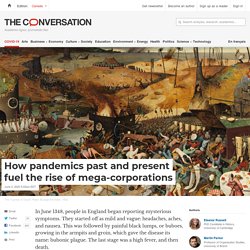
They started off as mild and vague: headaches, aches, and nausea. This was followed by painful black lumps, or buboes, growing in the armpits and groin, which gave the disease its name: bubonic plague. The last stage was a high fever, and then death. Originating in Central Asia, soldiers and caravans had brought bubonic plague – Yersina pestis, a bacterium carried on fleas that lived on rats – to ports on the Black Sea. The highly commercialised world of the Mediterranean ensured the plague’s swift transfer on merchant ships to Italy, and then across Europe. This huge number of deaths was accompanied by general economic devastation.
Covid-19 to send almost all G20 countries into a recession - Economist Intelligence Unit. Thu, 26th Mar 2020 This article was updated on 22 May to reflect the latest forecast data.

How the elephant lost its trunk - The Post. Chart.
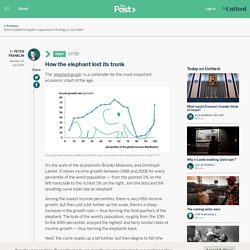
Greater Capitalism: How The Pandemic Is Permanently Reshaping Our Economic System For The Better. In a matter of weeks, Covid-19 spurred seismic shifts in how we work, learn and transact, and it helped usher in a new era that is smarter and fairer.

The surreal year 2020 produces a personal Groundhog Day effect. The clock moves at one-quarter speed as the time-numbing diversions and necessities of a century ago, from jigsaw puzzles to yeast, fly off the virtual shelves. Simultaneously, though, the world is transforming at a pace unlike any experienced since World War II. In a matter of weeks, seismic, permanent shifts have occurred in how we work, learn and transact. The most significant shift is taking place in our economic system itself. Google employees will work from home until at least summer 2021. Google will keep its employees home until at least next July, the Wall Street Journal reported Monday, marking the largest tech firm to commit to such a timeline in the wake of the coronavirus pandemic.
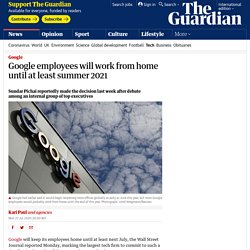
The chief executive officer of parent company Alphabet Inc, Sundar Pichai, made the decision himself last week after debate among an internal group of top executives that he chairs, according to the report, which cited unnamed insiders. Google did not immediately respond to request for comment. Google had earlier said it would begin reopening more offices globally as early as June this year, but most Google employees would probably work from home until the end of this year.
Most tech companies have had employees working remotely since the Covid-19 outbreak escalated in early March, and several have expressed plans to continue such policies indefinitely. 48 – The Post Corona World – Matthias Horx. Deutsche Version: Die Welt nach Corona A Backwards Corona Forecast: Or how we will be surprised when the crisis is „over“ © imagoimages At the moment I am often asked when Corona „will be over“ and when everything will return to normal.

My answer is: never. There are historical moments when the future changes direction. Our response to COVID-19 will help define the 21st century. This article was first published in the Financial Times (opens in a new tab).
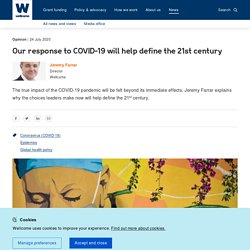
It is discomfiting but true that most people still underestimate the true impact of the COVID-19 pandemic. Its immediate effects are so shocking that we are all caught up in them. But the longer-term implications may be more profound still. If we are not careful, they will shake the world order to its foundations. Reporting, epidemic growth, and reproduction numbers for the 2019-nCoV epidemic: understanding control. Notes Cumulative cases (model estimates) represent outbreak size estimated using data on international case exportations [Imai et al.].
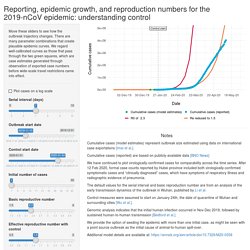
Cumulative cases (reported) are based on publicly-available data [BNO News] We have continued to plot virologically-confirmed cases for comparability across the time series. After 12 Feb 2020, formal case counts reported by Hubei province included both virologically-confirmed symptomatic cases and “clinically diagnosed” cases, which have symptoms of respiratory illness and radiographic evidence of pneumonia. Nextstrain / ncov / north-america. - The Washington Post. Latest Coverage of Coronavirus Treatment and Testing.
Coronavirus: Research, Commentary, and News. The Science journals are striving to provide the best and most timely research, analysis, and news coverage of COVID-19 and the coronavirus that causes it.
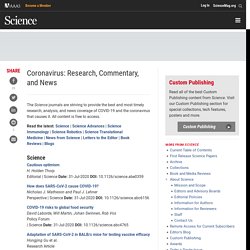
All content is free to access. Read the latest: Science | Science Advances | Science Immunology | Science Robotics | Science Translational Medicine | News from Science | Letters to the Editor | Book Reviews | Blogs Science Cautious optimismH. Holden Thorp Editorial | Science Date: 31-Jul-2020 DOI: 10.1126/science.abe0359. ViewPort. The Coronavirus Is a Special Mental-Health Disaster. To some extent, this was to be expected.
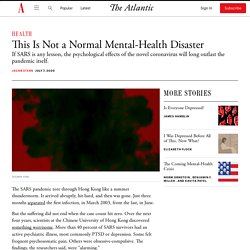
Depression, anxiety, PTSD, substance abuse, child abuse, and domestic violence almost always surge after natural disasters. And the coronavirus is every bit as much a disaster as any wildfire or flood. But it is also something unlike any wildfire or flood. “The sorts of mental-health challenges associated with COVID-19 are not necessarily the same as, say, generic stress management or the interventions from wildfires,” says Steven Taylor, a psychiatrist at the University of British Columbia and the author of The Psychology of Pandemics (published, fortuitously, in October 2019). “It’s very different in important ways.” Read: Two errors our minds make when trying to grasp the pandemic Most people are resilient after disasters, and only a small percentage develop chronic conditions.
Most disasters affect cities or states, occasionally regions. As a result, Ruzek told me, certain key tenets of disaster response no longer hold up. The Coronavirus Collection: Fact-Checking COVID-19 - Snopes.com. COVID19 incidence Dashboards. Lancet Inf Dis Article: Here. Mobile Version: Here. Lead by JHU CSSE. Automation Support: Esri Living Atlas team and JHU APL. Contact US. FAQ. - The Washington Post. Tracking the COVID-19 economy - Atlantic Council. China is experiencing an incredible Q2 economic rebound while the other 5 largest economies suffer historic downturns. This ‘fractured recovery’ puts enormous stress on supply chains and the global trading system. Can the rest of the world match China’s rebound in Q3? This is the most pressing question in the global economy today.
Note: All these graphs are interactive. Hovering over the graphs reveals details. Unemployment trends have varied at different stages of this crisis. BIOLOGICA. Systems Complex.